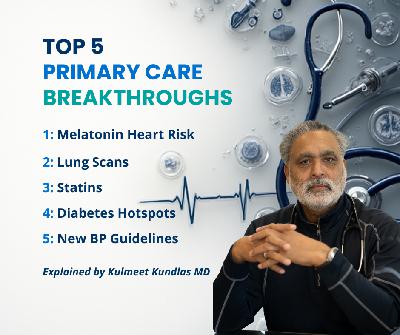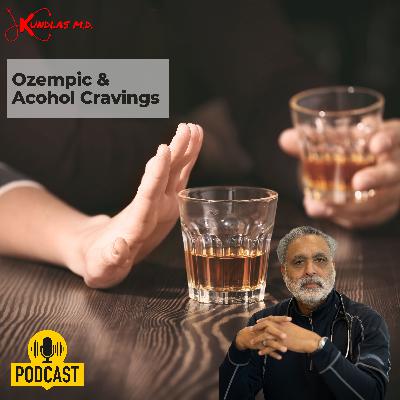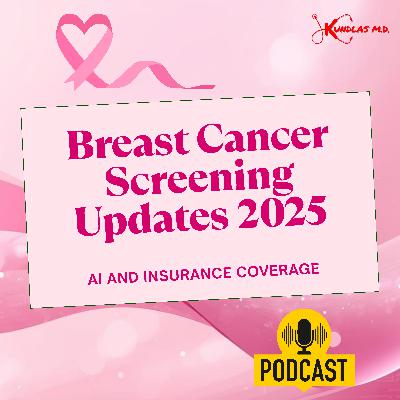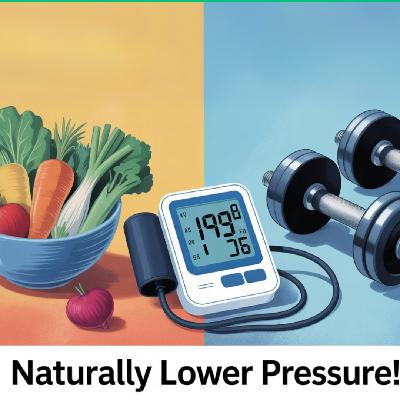Discover Primary Care Voice
Primary Care Voice

Primary Care Voice
Author: Kulmeet Kundlas M.D.
Subscribed: 2Played: 40Subscribe
Share
© Copyright 2023 All rights reserved.
Description
Primary Care Voice With Kundlas M.D. is your dedicated space for delving into the intricate world of Primary Care. Hosted by the experienced and compassionate Primary Care Physician, Dr. Kulmeet Kundlas, this podcast sets out to bridge the gap between medical professionals and patients, unraveling the intricacies of healthcare.
In each episode, Dr. Kundlas and his expert guests dive deep into essential topics that encompass everything from preventive measures and chronic and acute disease management to cutting-edge telemedicine innovations, nurturing patient relationships, and staying updated on the latest medical trends
In each episode, Dr. Kundlas and his expert guests dive deep into essential topics that encompass everything from preventive measures and chronic and acute disease management to cutting-edge telemedicine innovations, nurturing patient relationships, and staying updated on the latest medical trends
106 Episodes
Reverse
This is a video about Ivermectin: From COVID to Cancer Hope
In this episode, we discuss the resurgence of Ivermectin, not for COVID-19, but as a potential treatment for cancer. With significant backing from Florida's Governor Ron DeSantis and First Lady Casey DeSantis, the Florida Cancer Innovation Fund has been launched, amassing $140 million for research. We explore the journey, mechanisms, and scientific goals behind repurposing Ivermectin for cancer. This well-established drug, known for treating parasitic infections, could hold promise for cancer treatment through mechanisms such as inducing cancer cell death, reducing chemotherapy resistance, and acting as an immune modulator. Join us to understand the science, controversies, and potential outcomes of this significant research initiative.
How to Differentiate Between Common Cold and Flu: A Comprehensive Guide
In this informative video, Dr. Kundlas explains the key differences between the common cold and flu, including symptoms, onset, severity, and duration. Learn how to identify whether you're suffering from a cold or flu and understand the potential complications of influenza, especially for high-risk individuals.
Dr. Kundlas provides helpful guidelines for diagnosis, treatment, and prevention, emphasizing the importance of seeking medical help when necessary. Stay informed and protect your health with valuable insights and recommendations on managing respiratory illnesses.
Newsday in Primary Care | Top Medical Updates This Week with Dr. Kulmeet Kundlas
Welcome to Newsday in Primary Care — your trusted weekly update on the latest research, medical breakthroughs, and practical clinical insights. In this episode, Dr. Kulmeet Kundlas (Kundlas MD) unpacks this week’s top headlines in primary care, bringing clarity to complex health topics and giving you actionable strategies to improve patient care and personal well-being.
📰 This Week’s Top Stories:
1️⃣ Melatonin & Heart Failure Risk New research reveals a surprising link between melatonin use and increased risk of heart failure. Learn how melatonin affects heart receptors, nitric oxide pathways, and what patients with heart conditions should do now.
2️⃣ Diagnosing Respiratory Diseases Beyond Spirometry Traditional spirometry isn’t always enough. Discover how cutting-edge imaging with inhaled MRI particles is revolutionizing COPD and lung disease diagnosis.
3️⃣ Hypertension Management & Updated Guidelines Explore the latest blood pressure control strategies — from lifestyle changes to the role of GLP-1 and SGLT2 inhibitors — plus the importance of home monitoring and the new PREVENT cardiovascular risk calculator.
4️⃣ Diabetes Control & Social Determinants of Health Understand how socioeconomic and lifestyle factors impact diabetes complications, even at the same A1C levels — a true paradigm shift in chronic disease management.
5️⃣ Statins, Calcium Scoring & Personalized Heart Care The debate around statins continues. Find out how coronary calcium scoring helps tailor cholesterol treatment and how medicine is moving from “one-size-fits-all” to personalized care.
💡 Key Takeaways Melatonin may increase heart failure risk — reconsider its use if you have cardiac conditions. New imaging tools may redefine how we diagnose lung diseases. Tighter blood pressure control and lifestyle focus are essential. Social and behavioral factors are just as critical as lab numbers in diabetes care. Personalized medicine is the future of cholesterol and heart disease management.
👨⚕️ About Dr. Kulmeet Kundlas
Dr. Kundlas is dedicated to simplifying complex health information and answering the fundamental questions: why, when, and how. His mission is to empower patients and healthcare professionals with reliable, evidence-based insights for better decision-making and healthier living.
📅 Stay Connected 👉 Subscribe for weekly updates:
@KundlasMD 👍 Like, comment, and share to support the channel. 💬 Your feedback keeps these discussions alive and helps us bring you better, relevant medical updates every week.
📍 Next Newsday Episode: Tuesday — stay tuned for more primary care news and clinical insights!
#PrimaryCare #MedicalNews #HealthUpdates #DrKundlas #Cardiology #Diabetes #Hypertension #COPD #PreventCalculator #Statins #LifestyleMedicine #PersonalizedCare
Exploring the Impact of Ozempic on Alcohol Cravings:
A New Hope? In this episode, we delve into the viral news about Ozempic, a medication primarily for diabetes and weight loss, and its surprising potential to reduce alcohol cravings. Discussions on Reddit and social media suggest many patients have experienced less desire for alcohol while on Ozempic. A small study involving 49 participants with alcohol use disorder showed a 40% reduction in binge drinking days, albeit without a decrease in the number of drinking days. The video emphasizes that while these findings are promising, they are preliminary and not FDA-approved for alcohol use disorder. More extensive and diverse studies are needed. The video aims to inform patients and clinicians about balancing hope with caution, and encourages continued participation in established treatments like Alcoholics Anonymous.
Managing Nausea & Stomach Discomfort on Ozempic: Essential Tips
Join Dr. Kundlas as he explains why nausea and stomach discomfort occur when taking Ozempic for diabetes or weight loss, how these symptoms indicate the drug is working, and tips to manage them. Learn dietary adjustments, symptoms to watch for, and the importance of staying in touch with your healthcare provider. Understand how patience and persistence through the initial phases can lead to long-term success. For more resources, visit NovaCare, ADA, and Shield Medical Group. Like, share, and subscribe for more helpful insights.
Ozempic and Constipation: Causes, Solutions, and When to Worry
In this episode, Dr. Kulmeet Kundlas explains why Ozempic (semaglutide), a medication for diabetes and weight loss, can cause constipation. Learn how Ozempic affects your digestive system, what's considered normal, and when to seek medical advice. Discover effective and safe ways to alleviate constipation, such as increasing hydration, dietary fiber, and incorporating gentle exercise into your routine. Dr. Kundlas also offers tips for managing medication side effects and emphasizes the importance of consistency in your habits for gut health. Like, share, and subscribe to KUNDLASMD for more helpful videos.
Breast Cancer Screening 2025: Updates, AI Role, Insurance Coverage, and FAQs
October is Breast Cancer Awareness Month. This video provides an update on new guidelines for breast cancer screening, the role of artificial intelligence, and insurance coverage for mammograms. Starting at age 40 and continuing every two years up to 74, screenings are crucial for early detection. Learn about dense breast notifications coming in 2025, the advantages of 3D mammograms, and key insights into common questions and myths about breast cancer. Discover why artificial intelligence can significantly reduce radiologists' workloads and improve diagnostic accuracy. Stay informed with evidence-based guidelines and make the most of life-saving screenings. Subscribe for more informative videos on breast cancer and related health topics.
00:00 Breast Cancer Screening in 2025: What Every Woman (and Man) Should Know.
01:21 Understanding Dense Breasts 02:19 100% Coverage of Mammogram by All Insurances
02:43 The Role of Artificial Intelligence in Screening
05:00 Common Questions About Breast Cancer
06:55 3D vs 2D Mammograms
07:43 Understanding BioRad Classification
09:11 Breast Pain and Cancer
09:40 Deodorants and Breast Cancer Risk
15:02 Addressing Social Media Myths 16:39 Final Thoughts and Resources
How High Blood Sugar Affects Your Body: Understanding Advanced Glycation End Products
In this episode of Kundlas MD, Dr. Kulmeet Kundlas explains how high blood sugar caramelizes the body internally, forming sticky crusts and rust-like substances called advanced glycation end products (AGEs). These AGEs damage blood vessels, organs, and tissues, leading to serious complications like blindness, kidney damage, and nerve damage. Learn the importance of maintaining hemoglobin A1C levels, adopting a plant-based diet, and exercising regularly to slow down the effects of high blood sugar and protect your health.
Understanding Hemoglobin A1C: How Small Changes Make a Big Impact
In this video, we explore the importance of hemoglobin A1C levels and their impact on your health. Learn how even a 1% reduction in A1C can significantly lower your risk of complications such as heart attacks, strokes, and vision loss. Discover why hemoglobin A1C is considered your body's average blood sugar report card for the past two to three months and the ways to manage and improve your levels for a healthier life. Don't forget to like and subscribe for more informative content on diabetes management!
Can Type 2 Diabetes Be Reversed or Put into Remission?
Dr. Kundlas explains how nearly half of people with Type 2 diabetes can put the disease into remission through lifestyle changes. He emphasizes that while Type 2 diabetes cannot be 'reversed', it can be controlled to the point where medication may not be needed. Dr. Kundlas discusses the importance of losing 10-15% of body weight, correcting daily habits, and maintaining a structured diet and regular physical activity. He compares the condition to cancer in that it can go into remission but not be completely cured. Dr. Kundlas also cautions against crash diets and highlights the need for medical help if lifestyle changes are not enough. Finally, he shares his personal success story of reversing complications by losing 27 pounds, encouraging viewers to like, share, and subscribe to the channel.
Preventing Diabetic Kidney Disease: Simple Tests and Effective Strategies Living with diabetes? Learn how it impacts your kidneys and discover essential tests that can detect early kidney damage. This video explains how high blood sugar can harm your kidneys and highlights lifestyle changes and medications that can protect them. Understand the role of ACE inhibitors, SGLT-2 inhibitors, and GLP-1 receptor agonists in kidney health. Follow practical tips on diet, exercise, and regular monitoring to keep your kidneys in top shape. Dr. Kme Kundlas provides clear guidance for managing diabetic kidney disease and improving overall kidney health.
Mastering Diabetes Self-Management: Essential Tips and Strategies Join Dr. Kulmeet Kundlas as he delves into the crucial principles of diabetes self-management. With 27 years of experience caring for over 10,000 diabetics, Dr. Kundlas shares evidence-based practices from reputable sources like the CDC and American Diabetic Care Education Specialist. Learn about the seven core pillars of self-management: healthy coping, healthy eating, regular physical activity, proper medication adherence, vigilant monitoring, problem-solving skills, and understanding the diabetes care system. This comprehensive guide offers practical, actionable tips and a roadmap to help you manage diabetes effectively. Subscribe to KundlasMD for more in-depth educational content.
Pre-Diabetes: Your Early Warning Sign to Prevent Type 2 Diabetes In this episode, Dr. Kulmeet Kundlas delves into the critical topic of pre-diabetes, emphasizing its role as a major health warning sign. Learn why pre-diabetes is not a prelude but a significant health threat already causing damage to your organs and increasing the risk of severe conditions like heart attacks and strokes. Discover the key lab tests for diagnosis, the sneaky signs and symptoms, and practical tips for reversing pre-diabetes. This information could save your life and lessen your financial burden. Stay informed and take your health into your hands.
Ozempic & Vision Loss: Separating Fact from Fiction In this video, Dr. Kulmeet Kundlas examines recent claims linking Ozempic (Semaglutide), a popular diabetes and weight loss medication, to cases of vision loss. The episode explores the specifics of Non-Arteritic Anterior Ischemic Optic Neuropathy (NAION) and other eye complications potentially associated with Ozempic. Dr. Kundlas provides a balanced view on the current scientific evidence, emphasizing the rarity of these side effects compared to the significant benefits of the drug. Patients and doctors are advised on how to mitigate risks and when to seek medical advice. Stay informed and get a professional perspective on this important health issue.
Navigating Diabetes: From Diagnosis to Living Well In this episode, Dr. Kulmeet Kundlas, a primary care physician, addresses the emotional and physical challenges faced by individuals diagnosed with diabetes. Covering aspects such as the stages of grief, understanding the condition, medication options, lifestyle changes, and common misconceptions, Dr. Kundlas offers a comprehensive guide to managing diabetes effectively. Tune in to learn about reversing diabetes, dietary adjustments, long-term management, and how to lead a quality life despite the diagnosis.
AI in Healthcare: Transforming Patient Care and Communication This vidoe explores the challenges of modern healthcare—patients feeling unheard, staff delays, rushed appointments, and the overwhelming burden of documentation that weakens doctor-patient relationships. It introduces artificial intelligence (AI) as a solution to these longstanding frustrations. Key points from your script: • AI as a Solution: AI tools are described as untiring "ears and eyes" for both patients and doctors. These tools can listen without judgment, recall data with precision, and present critical information to doctors at decision-making moments. • Transforming Patient Experience: AI fully reimagines the patient journey—from initial contact through post-visit care—making healthcare feel pleasant, efficient, and personalized. • Reducing Documentation Burden: AI automates clinical documentation, care coordination, and insurance communications, freeing doctors to spend more meaningful time with patients. • Enhancing Human Senses: AI augments human ability to process information, manage patient intake, and synthesize records from various sources, resulting in holistic patient profiles. • Multilingual Communication: AI-powered chatbots communicate in any language, triage queries, schedule appointments, and help streamline complex patient intake forms. Practices that have adopted AI chatbots report dramatic reductions in human workload—up to 82%. • Ambient Intelligence in the Exam Room: With AI assistants, conversations and medical histories are captured and documented in real time. Physicians can focus on natural conversation and examination, while AI handles records and follow-up tasks. • Efficiency & Empathy Restored: The office processes are streamlined so patient wait times drop below 20 minutes. AI enables healthcare teams to focus on patient care rather than administrative work. • AI as a Copilot: AI supports, but does not replace, doctors—acting as an empathetic copilot that enhances human senses, judgment, and healing abilities. The script emphasizes that AI will not replace doctors, but will amplify their capabilities and empathy, making healthcare more personal and efficient while maintaining compassion.
The Future of US Healthcare: Chronic Disease Crisis & Robert Kennedy's Vision In this episode, we dive deep into the United States' chronic disease pandemic and its implications on national health policies. As the Senate confirms President Trump's cabinet positions, particular focus is given to the Secretary of Health and Human Services. We explore the impact potential candidate Robert Kennedy could have on healthcare, considering his stance on NIH funding, chronic diseases, Big Pharma, Big Food, and environmental toxins. Additionally, we analyze the systemic and individual changes needed to tackle the healthcare crisis, the economics of chronic diseases, and the roles of government policies and individual lifestyle choices. Join us to get a comprehensive
Welcome to Newsday! In today's top five news stories for July 15th, 2025, #kundlasmd #shieldmedicalgroup we cover a significant decrease in funding for Messenger RNA technology affecting cancer treatments, potential declines in Medicaid beneficiaries due to a new bill, a Texas judge's decision impacting healthcare debt, increasing vaccine skepticism in the US, and a fatal case of the Mnemonic Plague in Arizona. Additionally, we discuss the rise in obesity-related chronic medical problems and cancers, emphasizing the importance of weight loss, regular exercise, and healthy eating.
Understanding Kidney Stones: Causes, Symptoms, and Prevention Have you ever experienced severe back or side pain? It may have been due to kidney stones. In this comprehensive video, Dr. Kundlas breaks down the causes, symptoms, and risk factors of kidney stones. Learn about the different types of kidney stones, how they form, and the treatments available. Dr. Kundlas also offers essential tips on how to prevent kidney stones, including dietary recommendations and hydration tips. Stay informed and proactive about your kidney health by watching this in-depth discussion. Don't forget to like, share, and subscribe for more health insights!
Welcome back to KundlasMD! In this comprehensive guide, I'll share evidence-based methods to lower blood pressure naturally, drawing from my 28+ years of clinical experience in internal and preventive medicine.











